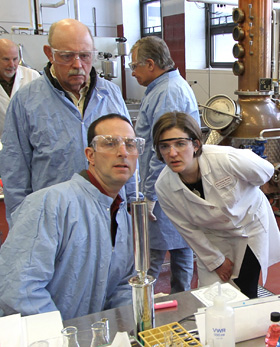Wine and vine experts receive $1.3 million for research to boost eastern wine industry
By Amanda Garris

Unpredictable rainfall, overly fertile soils, new varieties and a young industry -- these are but some of the challenges in producing quality wine in the eastern United States. Cornell has been awarded $1.3 million to address these problems in East Coast vineyards, wineries and tasting rooms as part of $3.8 million grant from the federal Specialty Crops Research Initiative (SCRI).
"This grant gives us the opportunity to collaborate with more than 30 of our colleagues to tackle the issues most important to the eastern U.S. wine industry," says Anna Katharine Mansfield, assistant professor of enology and grant co-investigator. "We hope that our work will lead to enhanced sustainability and economic vitality for the industry and help us understand consumer attitudes about regional wine."
SCRI grants are notable for their mandate to address complex problems in neglected crops using interdisciplinary research. Accordingly, this large project led by Virginia Tech enlisted Cornell viticulturists, enologists, plant pathologists, economists and extension specialists for projects affecting New York state and beyond, starting with the soil beneath the vines.
"In the northeastern United States, soils that are high in organic matter and excessive rainfall can cause problematic vine vigor, resulting in high production costs and reduced fruit quality," says Justine Vanden Heuvel, assistant professor of horticulture. "We will be testing the effectiveness of cover crops to slow the growth of shoots, resulting in higher quality fruit."
Vanden Heuvel will also work with horticulture professors Ian Merwin and Alan Lakso to dissect how light and temperature affect grape flavors and aromas -- from bitter to fruity -- in Riesling and cabernet franc. Plant pathology professor Wayne Wilcox will look at the corresponding effects on disease incidence, so that the project will produce comprehensive cultural recommendations appropriate to a grower's climate and target wine style.
In addition, Lakso and colleagues from other universities will use modeling to develop decision-making tools for vineyard managers, from identifying good matches between a potential vineyard site and grape variety to how much crop they can ripen in a particular vineyard.
Mansfield's wine research will focus on the varieties and production methods common to the region. The ultimate goal is to develop recommendations that will improve wine quality through appropriate fruit processing. She will experiment with winemaking techniques to minimize the flaws in wines made from red hybrid grapes -- the low tannins and phenolics that can make them seem thin on the tongue -- and enhance the signature aromas of such regional whites such as Riesling, Traminette and Gewurztraminer.
"Ultimately, consumers will decide the future of the East Coast wine industry," says Brad Rickard, assistant professor of applied economics and marketing. "The economic component of the project will help to pinpoint the target consumers for East Coast wines and understand how they would respond to various marketing strategies."
Rickard's goal is to experiment with different advertising approaches to see how they influence consumers' interest in -- and willingness to pay for -- wines made in the eastern United States.
Several Finger Lakes vineyards, including Hosmer, Anthony Road, Bedient, Swedish Hill and Lamoreaux Landing, are collaborating with the project by donating fruit or vineyard space. And during the five years of the project, the entire New York wine industry can expect to see new online resources funded by the grant. Extension associates Jodi Creasap-Gee, Hans Walter-Peterson and Chris Gerling will translate the research findings for growers and winemakers, with new how-to videos, podcasts, e-bulletins and regular updates on the team's research results on the Cornell viticulture and enology outreach website.
Amanda Garris is a freelance writer based in Geneva.
Media Contact
Get Cornell news delivered right to your inbox.
Subscribe